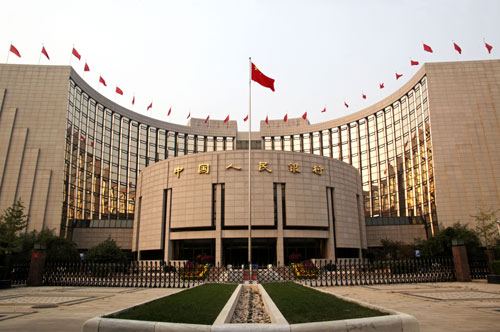Banks' yuan positions declined in Oct
Updated: 2011-11-22 09:26
By Wang Xiaotian (China Daily)
|
|||||||||
Economists expect slowdown in appreciation, monetary loosening
BEIJING - Chinese banks' yuan positions for foreign exchange purchases fell for the first time in four years last month, sparking expectations of a slowdown in yuan appreciation and monetary loosening measures.
|
 |
|
The headquarters of the People's Bank of China in Beijing. Yuan positions are an indicator of the flow of "hot money", which Chinese regulators said they will crack down on by strengthening supervision of "abnormal" capital outflows. [Photo/China Daily] |
Yuan positions declined by 24.9 billion yuan ($3.9 billion) in October, according to data posted on the website of the People's Bank of China (PBOC), the central bank, on Monday.
Analysts usually see the yuan position as an indicator of "hot money" inflows or outflows.
"The capital outflows demonstrate that international investors are increasingly worried about the very likely slowdown of China's economic growth in the next year, the risks lying in lending to local governments through financial vehicles, and the gloomy capital market," said Zhuang Jian, senior economist at the Asian Development Bank.
In the third quarter, net inflows of foreign direct investment declined by 25 percent compared with the previous quarter to $35.9 billion, and the financial account surplus dropped by 65 percent, according to data from the State Administration of Foreign Exchange (SAFE).
Zhuang said that as the trade surplus continues to narrow in 2012, the appreciation of the yuan will decelerate and there will even be a depreciation in the future as a trade deficit develops.
Li Daokui, an academic adviser to the central bank's monetary policy committee, has said previously that since the trade surplus might account for less than 1.6 percent of GDP in 2011, the yuan might depreciate in two years.
"Capital outflows are evidence that the yuan is overvalued, not undervalued," Bloomberg News cited Tim Condon, Singapore-based head of Asian research at ING Groep NV, as saying.
"We think the suggestion of outflows is a near insurmountable obstacle to any exchange-rate reform like widening the yuan trading band."
But Zhuang said that the outflows would create a better environment for China to let market forces determine the exchange rate, because successful currency reform must be based on the possibility of fluctuations in both directions.
"We continue to expect a gradual yuan appreciation, although a slower pace of capital inflows and moderating inflation would reduce the pressure for rapid yuan appreciation. Despite some market concerns, we do not think that outright yuan depreciation looks likely now," said Chang Jian, a China economist with Barclays Bank PLC.
The currency has appreciated 4 percent this year. On Monday, 12-month non-deliverable yuan forwards dropped 0.06 percent to 6.3363.
Analysts also said that capital outflows could ease pressure on the government and give it more room to loosen policy, because the PBOC won't need to inject as much money into the market as it did previously to sterilize new foreign exchange and keep the exchange rate stable.
"It is logical to expect the Chinese government to take more loosening moves as liquidity pressure eases, such as trimming the reserve requirement ratio of commercial lenders to shore up small and medium-sized enterprises," said Zhuang.
But Lu Zhengwei, chief economist at Industrial Bank Co, said that the decline of yuan holdings in October was too slight to have a substantial effect on monetary conditions, and a cut in the reserve ratio was unlikely before year-end.
"But some minor adjustments, such as much lending and some open market operations, are possible," said Lu.
China will strengthen supervision of "abnormal" capital outflows as it continues cracking down on "hot money", SAFE said on Monday.
"To policymakers, it matters a lot whether the capital outflow is just a short-term phenomenon or could represent a long-term trend," said Zhuang.










